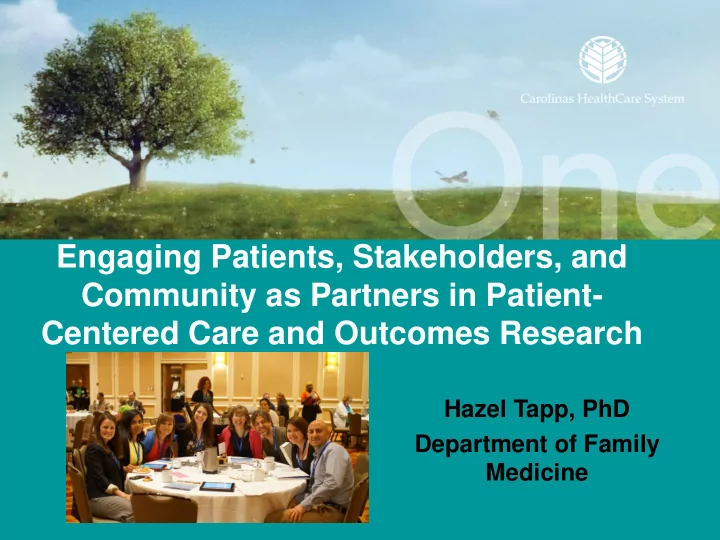

Engaging Patients, Stakeholders, and Community as Partners in Patient- Centered Care and Outcomes Research Hazel Tapp, PhD Department of Family Medicine
Why do we need patient or stakeholder voices in patient care or outcomes research? • As providers and researchers we’ve been trained for many years in disease knowledge, research methods, and patient management. • Aren't we all patients anyway? • Is there really a problem? 2/6/2015 2
Principles for Engaging Patients in Research • Engage patients and surrogates in all research phases • Engage patients based on the research questions being asked and the overall aims of the research • Initiate patient engagement as early and frequently as possible • Select representatives similar to the community or population studied 2/6/2015 3
Trust • Key element for patient-centered research • By establishing and maintaining trust between researchers and patients, patients are motivated and empowered to actively participate in a learning environment • Trust is achieved through a process of continuous partnering with the patient, family, and community 2/6/2015 4
Evaluation Methods • Mapping of Patient Population with Disease or Condition to Census Tracks • EMR Disease Outcome Data • Reduction in ED and Inpatient Visits • Focus Groups – access to care; disease management • Surveys (patient satisfaction; quality of life; disease specific) • Key Informant interviews • Ethnography 2/6/2015 5
Engaging Patients in Patient Centered Care 2/6/2015 6
Shared Decision Making • Patient provides information to the physician on values and preferences • Provider gives treatment options and the benefits and risks of each Cartoon by Aaron Bacall 2/6/2015 7
A Meeting of Two Experts Provider gives all relevant disease Patient gives information: information on: benefits and risks of values, preferences, various treatments lifestyle, beliefs, and and potential effects current knowledge on the patient's about the illness and psychological and its treatment social well being 2/6/2015 8
Engaging Patients in Research 2/6/2015 9
Patient and Stakeholder Roles in ADAPT-NC • Individual Patients – Study design discussions – Planning meetings and materials assistance (eAAP) – Participate in meetings with practices to discuss how the implementation of the intervention is going. • Community Care of North Carolina Asthma Workgroup – Assist with recruitment and gave input into the toolkit • Members of Mecklenburg County Asthma Coalition – Dissemination • Patient Advisory Board – Feedback and updates 2/6/2015 10
Community Advisory Boards (CAB) 2/6/2015 11
Community Based Participatory Research (CBPR) • “Is the collaborative approach to research that involves all partners in the research process and recognizes the unique strengths that each brings. • CBPR begins with a research topic of community importance, and has the aim of combining knowledge with action to achieve social change that improve health outcomes.” 2/6/2015 12 WK Kellogg Foundation Community Health Scholars Program, September 10, 2012
2/6/2015 13
2/6/2015 14
Community Advisory Board • Reach out to key community stakeholders and engage in the development of the research proposals • Establish a set time and day that meetings will take place • Provide meals • Encourage members to take part in the research process – Assist in data collection – Participant recruitment – Direct contact with community members • Ask for constant feedback about the process and their participation 2/6/2015 15
Needs Assessment 2/6/2015 16
Designing, Conducting and Disseminating Results of Pragmatic Research: A Few Considerations for Patient Engagement Milton “Mickey” Eder PBRN Pragmatic Research And Translation Learning Group January 5, 2015
Ethical Issues for Patient Engagement? Do Pragmatic Clinical trials blur distinctions between Treatment and Research? Doctor/patient and investigator/subject-participant relationship? e.g., therapeutic misconception; current standard of care questions (SUPPORT study)
Who Engages Patients? Research Staff? and/or Practice Staff? How is recruitment organized? Who obtains informed consent? Who responds to questions about a research project within the office? Image from http://www.fowlersgroup.com.au/blog/2012/10/finding-the-right-balance-for-you/
Engaging Patients and Practices ? Who trains/educates patients? ? Can Pragmatic Trials successfully compare treatment options and involve patients in asking health services and office/practice questions? ? How to include physician and staff practice issues ( e.g ., practicality of treatment, cost/reimbursement) in projects?
Results: Timeliness Challenges ? Will researchers share preliminary results with patients? Communities? How to present preliminary results? ? Will publication delay release of results? ? Are researchers prepared to translate results for non- specialists and develop multiple reports Dr. Susie Nanney, University of Minnesota Community Presentation, November 13, 2014
Recommend
More recommend